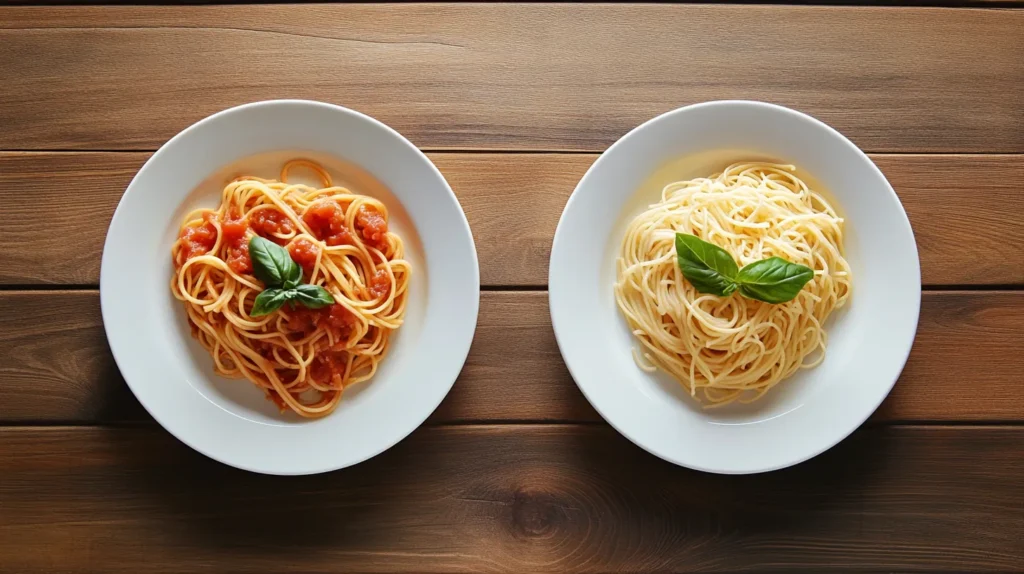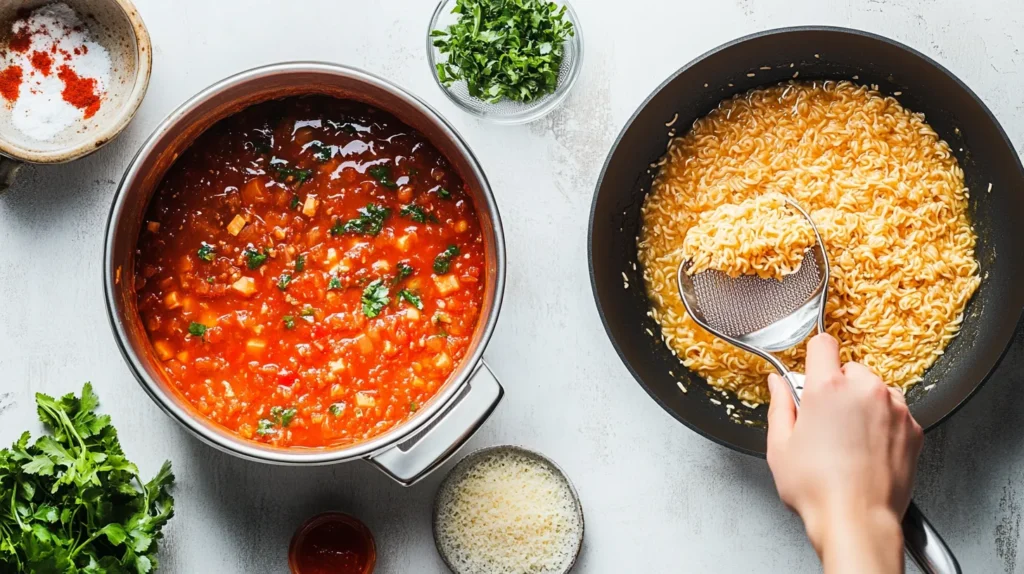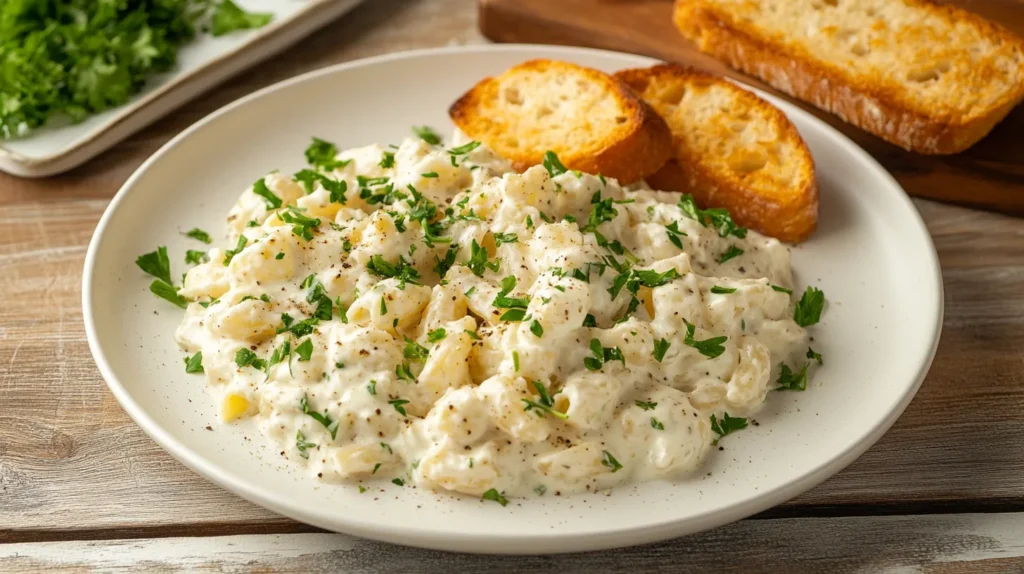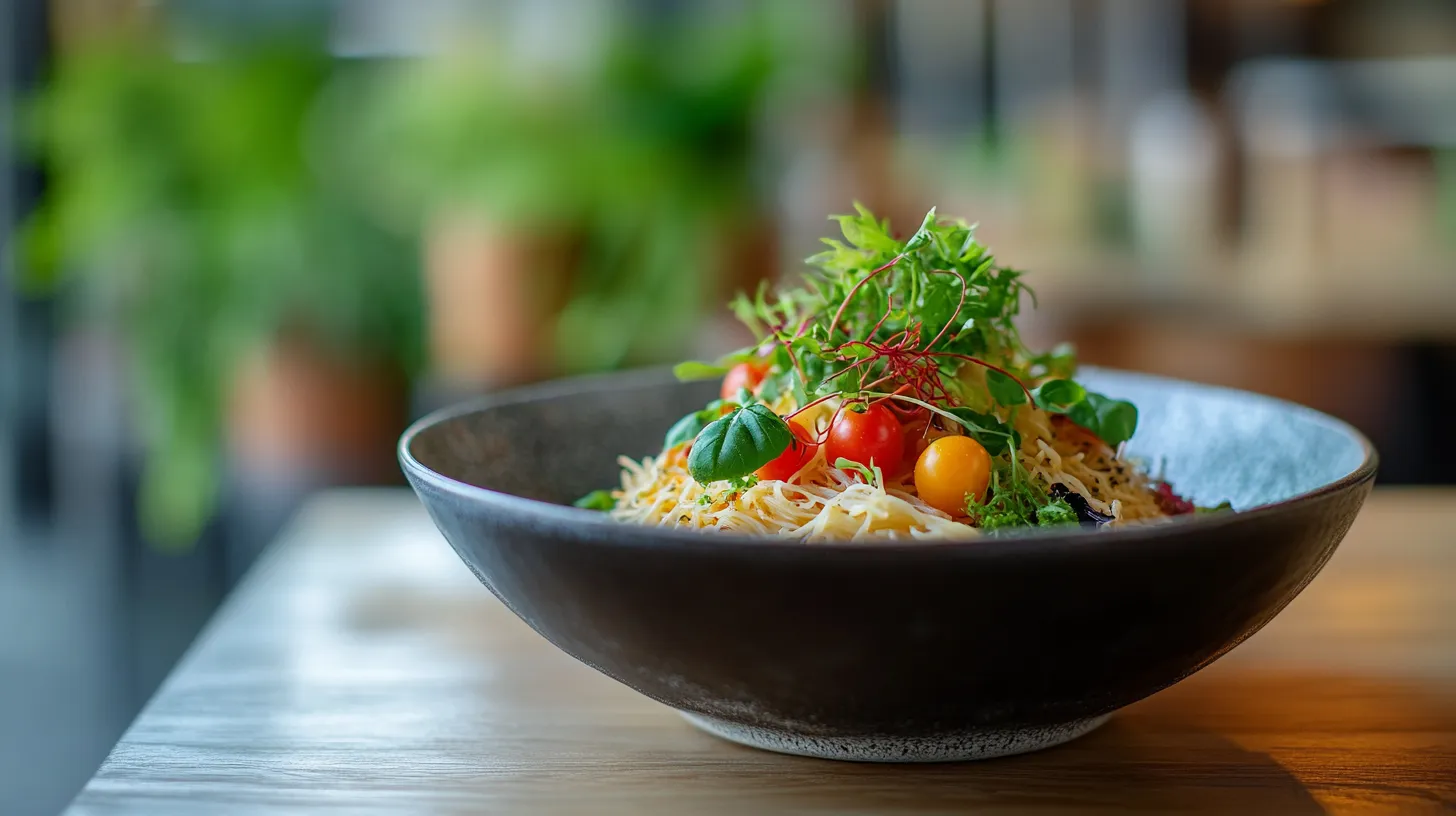Discover the secret to enjoying your favorite pasta dishes without the guilt! Skinny Pasta is a game-changer for health-conscious food lovers, offering a low-calorie, carb-friendly alternative that doesn’t compromise on taste or texture. Say hello to a delicious revolution in healthy eating!
Table of contents
- What is Skinny Pasta?
- Health Benefits of This Pasta Alternative
- Types of Skinny Pasta
- How to Cook Skinny Pasta
- Skinny Pasta Recipes
- Skinny Pasta vs Traditional Pasta
- Common Problems with Skinny Pasta
- Is Skinny Pasta Right for Everyone?
- Expert Tips for Enjoying Skinny Pasta
- What to Serve with Skinny Pasta
- Frequently Asked Questions
- Conclusion
What is Skinny Pasta?
This pasta is the superhero of the culinary world. It swoops in to save the day when you’re craving carbs but want to keep things light and healthy. But what exactly is it?
The Origin and Concept of Skinny Pasta
This type of pasta originated as a healthier alternative to traditional wheat-based options. The most popular variety, shirataki noodles, hails from Japan and is made from the konjac yam. Fun fact: Shirataki means “white waterfall” in Japanese, referring to the noodle’s translucent, flowing appearance.
Unlike traditional options, this pasta is often made from plant-based ingredients, which makes it low in calories and carbs. Some versions are made from lentils, chickpeas, or even zucchini (hello, zoodles!). The goal? To offer a lighter, nutrient-packed alternative to the classic dishes we all know and love.
Key Ingredients That Make Skinny Pasta Unique
Here’s the magic: this type of pasta is typically made from ingredients like konjac flour, zucchini, or chickpeas. These are naturally low in calories, high in fiber, and often gluten-free. For instance, konjac-based varieties contain glucomannan, a type of soluble fiber that expands in your stomach to keep you feeling full.
It’s like pasta got a makeover, and honestly? We’re here for it!
“Skinny pasta isn’t just a substitute; it’s a smarter, tastier choice for mindful eaters.”

Health Benefits of This Pasta Alternative
Why is this pasta alternative taking the world by storm? Because it’s not just tasty it’s practically a health food superhero.
How This Pasta Alternative Aids in Weight Management
Let’s get real. Most of us are trying to watch our weight without giving up the foods we love. Skinny pasta makes this possible by being incredibly low in calories. A typical serving of shirataki noodles has only 10-20 calories! Compare that to the 200+ calories in regular pasta, and you’ve got a no-brainer.
And here’s the kicker: the fiber in skinny pasta keeps you feeling full, so you’re less likely to snack later. It’s like having a hidden advantage in your weight-loss journey.
Skinny Pasta for Diabetics: A Glycemic Index Advantage
This pasta alternative is a blessing for people with diabetes or anyone watching their blood sugar levels. Thanks to its low glycemic index, it doesn’t cause the same spikes in blood sugar that traditional options can.
For instance, konjac-based pasta slows digestion, which helps maintain steady blood sugar levels. That means you can enjoy a hearty bowl of pasta without worrying about the dreaded sugar crash.
Nutritional Profile of Skinny Pasta
Let’s break it down:
| Nutrient | Skinny Pasta (per serving) | Traditional Pasta (per serving) |
|---|---|---|
| Calories | 10-20 | 200+ |
| Carbohydrates (g) | 1-5 | 40-50 |
| Fiber (g) | 4-6 | 2-3 |
| Protein (g) | 0-2 | 7-8 |
| Gluten-Free? | Yes | No |
See the difference? Skinny pasta isn’t just low-calorie it’s practically guilt-free!
Types of Skinny Pasta
When it comes to skinny pasta, variety is the spice of life. Whether you’re craving something traditional or adventurous, there’s a skinny pasta for every palate.
Shirataki Noodles: The Star of Skinny Pasta
Shirataki noodles are the poster child of skinny pasta, and for good reason. Made from konjac yam, they’re virtually calorie-free and have a jelly-like texture. They’re perfect for soaking up sauces, making them incredibly versatile.
Some people find their texture a little slippery, but don’t worry we’ll cover how to cook them perfectly later on.
Other Variants: Zoodles, Lentil Pasta, and More
Not a fan of shirataki? No problem! Here are some other pasta alternative options to explore:
- Zoodles (Zucchini Noodles): Spiralized zucchini that’s fresh, crunchy, and perfect for salads or light sauces.
- Chickpea or Lentil Pasta: Packed with protein and fiber, these are ideal for a more traditional pasta experience with added nutrients.
- Spaghetti Squash: When cooked, this squash naturally forms spaghetti-like strands. It’s like nature’s skinny pasta!

How to Cook Skinny Pasta
So, you’ve bought your first pack of this pasta alternative. Now what? Don’t worry I’ve got you covered. Cooking it is a bit different from regular pasta, but once you get the hang of it, it’s a breeze.
Step-by-Step Cooking Guide
Here’s how to cook shirataki noodles:
- Rinse Thoroughly: Shirataki noodles come packed in a liquid that can have a strong smell. Rinse them under cold water for a few minutes to get rid of it.
- Boil or Parboil: Boil the noodles for 2-3 minutes to soften them and improve the texture.
- Dry Them Well: Toss the boiled noodles in a hot, dry skillet for a minute to remove any excess moisture. This helps them absorb sauces better.
- Add Sauce and Enjoy: Now you’re ready to mix them with your favorite sauce or toppings.
Common Mistakes and How to Avoid Them
- Skipping the Rinse: Always rinse shirataki noodles thoroughly to remove their natural odor.
- Not Drying Properly: If you skip the drying step, the noodles might end up watery and unappetizing.
- Overcooking: This pasta alternative doesn’t need much cooking time, so keep an eye on it to avoid mushy results.

Skinny Pasta Recipes
Ready to turn your pasta alternative into a mouthwatering masterpiece? Here are some recipes to help you begin:
Skinny Pasta with Creamy Alfredo Sauce
Ingredients:
- Skinny pasta (shirataki noodles) – 1 pack
- Greek yogurt – ½ cup
- Parmesan cheese – ¼ cup
- Garlic powder – 1 tsp
- Salt and pepper – To taste
Instructions:
- Cook the shirataki noodles as per the guide above.
- In a pan, mix Greek yogurt, Parmesan cheese, garlic powder, salt, and pepper. Heat on low until creamy.
- Toss the noodles in the sauce and serve with a sprinkle of fresh parsley.
Skinny Pasta vs Traditional Pasta
If you’ve ever wondered how this pasta alternative stacks up against traditional pasta, you’re in for a treat. While both can hold their own on your dinner table, the differences are night and day especially when it comes to health, taste, and texture. Which one earns a place in your pantry? Let’s break it down.
Calories and Carb Comparison
When it comes to calorie and carb content, this pasta alternative wins by a mile. Here’s a quick look:
| Category | Skinny Pasta (Shirataki) | Traditional Pasta |
|---|---|---|
| Calories (per cup) | 10-20 | 200+ |
| Carbohydrates (g) | 1-5 | 40-50 |
| Fiber (g) | 4-6 | 2-3 |
| Gluten-Free? | Yes | Not always |
This pasta alternative is practically guilt-free, making it perfect for anyone watching their calorie intake. Traditional pasta, while delicious, is carb-heavy and can leave you feeling sluggish after a big meal.
Taste and Texture Differences
Now, let’s talk about the elephant in the room: taste and texture. Does this pasta alternative taste like regular pasta? The short answer: not exactly.
- This Pasta Alternative: Has a unique, slightly chewy texture, especially shirataki noodles. It’s more about the sauce and toppings since the noodles themselves are very mild in flavor.
- Traditional Pasta: Boasts a soft, doughy texture that many of us grew up loving. It’s richer in taste, thanks to its wheat base.
This alternative may not replicate the exact experience of traditional pasta, but it comes pretty close when paired with a flavorful sauce.cate the exact experience of traditional pasta, but it comes pretty close when paired with a flavorful sauce. Think of it as the blank canvas to your culinary masterpiece.
Common Problems with Skinny Pasta
Let’s face it—skinny pasta can be a bit intimidating for first-timers. From its texture to its preparation, there are a few common hurdles. But don’t worry, I’ve got solutions for all of them!
Overcoming the Rubber-like Texture
Some people complain that shirataki noodles feel rubbery or slimy. If that’s been your experience, you’re not alone. Here’s the fix:
- Rinse, Boil, and Dry: Always rinse the noodles thoroughly to get rid of their initial odor, then boil them briefly to soften the texture. Finally, dry them in a hot skillet to remove excess moisture.
- Sauce is Key: Pair skinny pasta with a creamy or flavorful sauce to mask any lingering texture concerns.
How to Enhance the Flavor
Let’s be real: this pasta alternative doesn’t have much flavor on its own. But that’s not a bad thing it’s a blank slate for your creativity.
- Use bold sauces like marinara, pesto, or Alfredo.
- Add spices and herbs like garlic, basil, or chili flakes.
- Toss in roasted veggies or lean proteins for a complete meal.
Think of this pasta as the supporting actor to your culinary star once you dress it up, it’s award-worthy.thy.
Is Skinny Pasta Right for Everyone?
Skinny pasta might sound like a miracle food, but is it suitable for everyone? Let’s break it down.
Who Should Consider Skinny Pasta?
Skinny pasta is perfect for:
- Weight Watchers: Its low calorie and carb content make it ideal for weight loss.
- Diabetics: With its low glycemic index, it’s a safe choice for managing blood sugar levels.
- Gluten-Free Dieters: Most skinny pastas are naturally gluten-free.
- Vegans and Vegetarians: Many varieties are plant-based, making them a great protein alternative.
Possible Side Effects to Watch Out For
While skinny pasta is generally safe, there are a few things to keep in mind:
- Digestive Sensitivity: Some people may experience bloating or discomfort from the fiber in konjac.
- Allergies: Rare but possible, especially if you’re sensitive to certain plant-based ingredients.
Always start with small portions if you’re trying skinny pasta for the first time.
Expert Tips for Enjoying Skinny Pasta
This pasta alternative is more than just a low-calorie option it’s a chance to get creative in the kitchen. Here’s how to make the most of it.
Pairing Skinny Pasta with Healthy Toppings
The secret to enjoying this pasta alternative lies in the toppings. Here are some ideas:
- Veggie Boost: Add roasted bell peppers, spinach, or zucchini for extra nutrients.
- Lean Proteins: Toss in grilled chicken, shrimp, or tofu for a balanced meal.
- Nutty Flavor: Sprinkle toasted almonds or pine nuts for added crunch.
How to Incorporate Skinny Pasta into Your Meal Plan
Skinny pasta isn’t just for dinner. Get creative and use it in:
- Lunch Salads: Toss skinny pasta with fresh veggies and a light vinaigrette.
- Soups: Add it to broths for a filling, low-calorie option.
- Snacks: Create a quick stir-fry with skinny pasta and soy sauce.
What to Serve with Skinny Pasta
- Buffalo Chicken Pasta Bake: A cheesy, comforting dish that complements Skinny Pasta’s lighter texture.
- Spaghetti Squash Alfredo: A creamy yet low-carb alternative that pairs well with Skinny Pasta.
- Garlic Parmesan Chicken Pasta: A rich and aromatic option that brings out the best in Skinny Pasta.
- Mushroom Spinach Pasta: A nutrient-packed pasta dish with earthy flavors that enhance the meal.
Frequently Asked Questions
What is the best way to prepare skinny pasta?
The key is to rinse it thoroughly, boil briefly, and dry it in a skillet before adding your favorite sauce.
Can skinny pasta help with weight loss?
Absolutely! Its low calorie and high fiber content make it perfect for weight management.
Are there gluten-free options for skinny pasta?
Yes, most varieties of this pasta alternative, like shirataki noodles, are naturally gluten-free.
Does this pasta alternative taste the same as regular pasta?
Not exactly. This pasta alternative has a unique texture, but it takes on the flavor of whatever sauce you pair it with.
Conclusion
This pasta alternative isn’t just a food it’s a lifestyle change. Whether you’re looking to lose weight, manage your blood sugar, or simply eat healthier, this versatile ingredient has got you covered. With endless recipes and options, it’s time to say goodbye to carb guilt and hello to guilt-free indulgence. So go ahead, give it a try you might just find your new favorite meal.

Skinny Pasta
Equipment
- Strainer
- Skillet
Ingredients
Pasta Alternative
- 1 pack Shirataki noodles Rinsed thoroughly
- 1/2 cup Greek yogurt
- 1/4 cup Parmesan cheese Grated
- 1 tsp Garlic powder
- Salt and pepper To taste
Instructions
- Rinse the shirataki noodles thoroughly under cold water to remove any natural odor.
- Boil the noodles for 2-3 minutes to improve their texture.
- Dry the noodles in a hot, dry skillet for 1 minute to remove excess moisture.
- In a separate pan, mix Greek yogurt, Parmesan cheese, garlic powder, salt, and pepper over low heat until creamy.
- Toss the noodles in the sauce, mix well, and serve hot.
